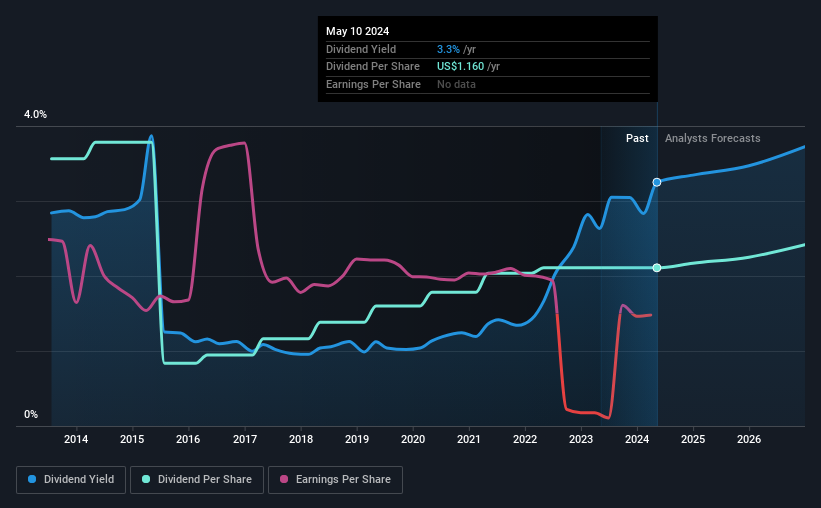Baxter International's (NYSE:BAX) Dividend Will Be $0.29
Baxter International Inc. (NYSE:BAX) will pay a dividend of $0.29 on the 1st of July. This means the annual payment is 3.3% of the current stock price, which is above the average for the industry.
View our latest analysis for Baxter International
Baxter International Doesn't Earn Enough To Cover Its Payments
If the payments aren't sustainable, a high yield for a few years won't matter that much. Despite not being profitable, Baxter International is paying out most of its free cash flow as a dividend. Generally it is unsustainable for a company to be paying a dividend while unprofitable, and with limited reinvestment into the business growth may be slow.
Over the next year, EPS is forecast to expand by 149.3%. If the dividend continues on its recent course, the company could be paying out several times what it earns in the next 12 months, which could start applying pressure to the balance sheet.
Dividend Volatility
The company's dividend history has been marked by instability, with at least one cut in the last 10 years. The dividend has gone from an annual total of $1.96 in 2014 to the most recent total annual payment of $1.16. Doing the maths, this is a decline of about 5.1% per year. Generally, we don't like to see a dividend that has been declining over time as this can degrade shareholders' returns and indicate that the company may be running into problems.
Dividend Growth Potential Is Shaky
Given that the track record hasn't been stellar, we really want to see earnings per share growing over time. Over the past five years, it looks as though Baxter International's EPS has declined at around 49% a year. Dividend payments are likely to come under some pressure unless EPS can pull out of the nosedive it is in. Over the next year, however, earnings are actually predicted to rise, but we would still be cautious until a track record of earnings growth can be built.
Baxter International's Dividend Doesn't Look Sustainable
Overall, it's nice to see a consistent dividend payment, but we think that longer term, the current level of payment might be unsustainable. The track record isn't great, and the payments are a bit high to be considered sustainable. Overall, we don't think this company has the makings of a good income stock.
Companies possessing a stable dividend policy will likely enjoy greater investor interest than those suffering from a more inconsistent approach. Still, investors need to consider a host of other factors, apart from dividend payments, when analysing a company. To that end, Baxter International has 2 warning signs (and 1 which is significant) we think you should know about. Is Baxter International not quite the opportunity you were looking for? Why not check out our selection of top dividend stocks.
Have feedback on this article? Concerned about the content? Get in touch with us directly. Alternatively, email editorial-team (at) simplywallst.com.
This article by Simply Wall St is general in nature. We provide commentary based on historical data and analyst forecasts only using an unbiased methodology and our articles are not intended to be financial advice. It does not constitute a recommendation to buy or sell any stock, and does not take account of your objectives, or your financial situation. We aim to bring you long-term focused analysis driven by fundamental data. Note that our analysis may not factor in the latest price-sensitive company announcements or qualitative material. Simply Wall St has no position in any stocks mentioned.

 Yahoo Finance
Yahoo Finance 
